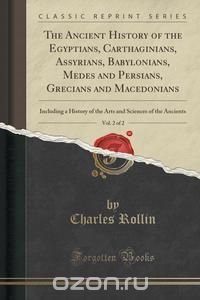Excerpt from The Ancient History of the Egyptians, Carthaginians, Assyrians, Babylonians, Medes and Persians, Grecians and Macedonians, Vol. 2 of 2: Including a History of the Arts and Sciences of the Ancients
In relating the death of Alexander the Great, I mentioned the many troubles and commotions that arose in the army on the first news of that event. All the troops in general, soldiers as well as officers, had their thoughts entirely taken up at first with the loss of a prince whom they loved as a father, and reverenced almost as a god, and abandoned themselves without reserve to grief and tears. A mournful silence reigned at first throughout the camp; but this was soon succeeded by dismal sighs and cries, which spoke the true language of the heart, and in which that vain ostentation of sorrow, which is too often paid to custom and decorum on such occasions, I had no share.
When the first impressions of grief had given place to reflection, they began to consider, with the utmost consternation, the state in which the death of Alexander had left them. They found themselves at an infinite distance from their native country, and amidst a people lately subdued, so little accustomed to their new yoke, that they were hardly acquainted with their present masters, and had not as yet nad sufficient time to forget their ancient laws, and that form of government under which they had always lived. What measures could be taken to keep a country of such vast extent in subjection? how could it be possible to suppress those seditions and revolts which would naturally break out on all sides in that decisive moment? what expedients could be formed to restrain those troops within the limits of their duty, who had so long been habituated to complaints and murmurs, and were commanded by chiefs, whose several views and pretensions were so different? The only remedy for these various calamities seemed to consist in a speedy nomination of a successor to Alexander; and the troops, as well as the officers, and the whole Macedonian state, seemed at first to be very desirous of this expedient, and, indeed, their common interest and security, with the preservation of their new conquests, amidst the barbarous nations that surrounded them, made it necessary for them to consider this election as their first and most important care, and to turn their thoughts to the choice of a person qualified to fill so arduous a station, and sustain the weight of it in such a manner as to be capable of Paflsim silentia et gemitus; nihil compositum iu ostontAlionem altius raoerebant. Tacit, maintaining general order and tranquillity. But ft had already been written, 2 that the kingdom of Alexander should be divided and rent asunder after his death, and that it should not be transmitted in the usual manner to his posterity. No efforts of human wisdom could establish a sole successor to that prince. In vain did they deliberate, consult and decide;3 nothing could be executed contrary to the preordained event, or, at least, nothing short of it could possibly subsist. A superior and invisible Power had already disposed of the kingdom, and divided it by an inevitable decree, as will be evident in the sequel. The circumstances of this partition had been denounced near three centuries before this time; the portions of it had already been assigned to different possessors, and nothing could frustate that division, which was only to be deferred for a few years. Till the arrival of that period, men indeed might raise commotions, and concert a variety of movements; but all their effort 3 would only tend to the accomplishment of what had been ordained by the sovereign Master of kingdoms, and of what had been foretold by his prophet. Alexander had a son by Barsina, and had conferred the name of Hercules upon him. Roxana, another of his wives, was advanced in her pregnancy when that prince died. He had likewise a natural brother, called Arida?us; but he would not upon his. Это и многое другое вы найдете в книге The Ancient History of the Egyptians, Carthaginians, Assyrians, Babylonians, Medes and Persians, Grecians and Macedonians, Vol. 2 of 2 (Charles Rollin)
